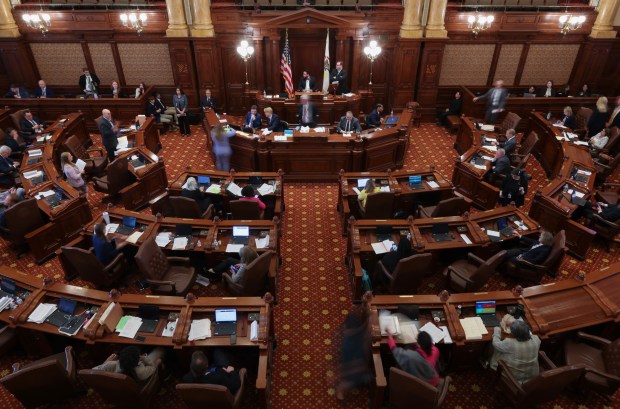Last-minute changes approved by Illinois lawmakers in the waning days of the session will cost Chicago taxpayers tens of millions of dollars in their first year and billions over time by giving some police officers and firefighters more lucrative pensions.
Lead sponsor Sen. Robert Martwick, a Chicago Democrat, told the Tribune the tweaks were a negotiated fix agreed to by Mayor Brandon Johnson and Gov. JB Pritzker that was promised to both bring parity between Chicago and downstate first responders and help bridge a shortfall in benefits for employees hired after 2010.
Johnson’s finance team estimated the initial cost would be $52 million in 2027. Budget watchdogs warned it will add billions to the city’s pension liability, a figure that topped $37 billion by the end of 2023.
“It adds to the city’s burdens at the worst possible moment, with no consideration of the city’s actual capacity to meet those burdens,” said Joe Ferguson, the president of the Civic Federation.
Chicago Chief Financial Officer Jill Jaworski’s office is still “conducting a comprehensive analysis” of the long-term cost of the legislation, her team said in an email, and would have updated figures in the coming weeks. “Given the speed with which the amendment was introduced, any estimates at this stage would be preliminary and subject to change.”
Downstate first responders received boosted benefits as part of the state’s landmark consolidation of their pension investments in 2019. Chicago police officers and firefighters argued they deserved the same and were assured that lawmakers would make good later.
Dave Sullivan, a lobbyist for the Fraternal Order of Police Lodge 7, wrote in the union’s monthly newsletter that several years ago Pritzker called “personally to assure me that he would make Tier 2 parity … a reality,” and he looked forward to the governor’s signature.
Pritzker’s office didn’t respond to a question about whether there was such an agreement and said the bill was under review.
Martwick said Johnson “understood a promise was made. I give him credit” for living up to it. “He continues to show — unlike so many of his predecessors — a willingness to solve the problem and consistency in terms of living up to those steps” to do so.
Mayor Lori Lightfoot more vocally opposed pension sweeteners during her term, including a last-ditch attempt to convince Pritzker to veto firefighter pension legislation that was projected to add between $18 million and $30 million to the city’s annual bill. Johnson, however, supported a similar bill for police in 2023, adding an estimated $60 million to the city’s immediate pension tab and $1 billion to the police fund’s total liability.
Jaworski did file an opposition slip to Martwick’s amendment in the Senate, testifying the change would cost an estimated $52 million in its first year and characterizing the proposal as “an unfunded mandate,” her office said.
The Johnson administration has been aware of the police and fire effort since at least two years ago, when the General Assembly considered similar legislation and delayed it at the request of the city, the bill’s sponsors said.
Simmering behind the city change is the failure of both city and state officials to come up with a fix for a projected shortfall in Tier II retirement benefits. Despite concerns that benefits for public employees at some point won’t be equal to what Social Security would provide — a violation of a federal “safe harbor” law — the legislature did not pass a comprehensive Tier II overhaul this session.
And Chicago officials who face the same problem haven’t published the findings of a pension working group convened two years ago. Martwick, a member of the working group, said this legislation does help partially address their shortfall.
Separately, the state budget passed this session includes a $75 million set-aside to help pay for the first year of expected adjustments for state Tier II employees.
The Chicago pension legislation makes three key benefit boosts.
First, it increases the final salary cap used to determine pension benefits for police and fire retirees from $127,283 to $141,408.
It also changes the rate at which that salary cap for police officers and firefighters rises every year. The current rate is either half of the rate of inflation or 3%, whichever is lower. The bill switches that calculation to the full rate of inflation or 3%, whichever is lower.
The third tweak changes the time frame to determine that final average salary figure. Right now, police officers’ benefits are based on the average of the highest salary from eight of the last 10 years of their career. The bill allows for an alternate calculation based on four of the last five years, a boon for officers who received big raises at the very end of their careers. Officers would be paid the higher of the two.
Firefighters already won that “dual-method” calculation in 2023. Downstate police and fire pensioners won it as part of the consolidation effort.
The change will definitely cost more, but how much will not be clear until the city or its pension funds perform an actuarial calculation.
Ferguson said based on the federation’s “back of the envelope” math, the fix creates a rising annual cost that will top out at $750 million by the 2050s and add billions to the funds’ long-term liabilities.
“It came late, mostly under cover of night, within the context of what was an utter whirlwind at the end of session,” Ferguson told the Tribune, noting the proposals were tucked in amid language to ensure children of deceased service members receive part of their parents’ pension benefits.
“It’s curious and it’s troubling that something of this magnitude was able to fly by without there being more meaningful discussion of its near- and long-term impact,” Ferguson said, especially from Chicago legislators.
Martwick filed the language as a gut-and-replace amendment in the last week of the spring legislative session. Lawmakers considered the legislation in a Senate committee a day later, and House lawmakers both discussed the matter in committee and passed the bill on the floor on the final day of the session.
Moving massive bills in the final days of spring session is often the norm in Springfield, which also saw lawmakers publicly introduce and pass a $55 billion budget package within days of adjournment this year.
“It’s important to underscore that the City was given very limited time to respond and was unable to conduct a fully validated, in-depth analysis before the hearing and the bill’s passage — despite the fact that the legislation will have significant and lasting implications for the City,” a spokesperson for Jaworski said.
Given the city knew the adjustment was a possibility years ago, Democratic Rep. Stephanie Kifowit said it was “disingenuous” to suggest the bill came at the last minute.
The Oswego lawmaker and bill sponsor pointed to video-gaming terminals as a potential funding source. State lawmakers repeatedly throughout the legislative session called for the city to use terminals to resolve its funding needs, but Chicago currently doesn’t allow them. Critics fear terminals would cannibalize revenues at Bally’s casino, which are already dedicated to public safety pensions.
“Their lack of movement on providing revenues for pensions is, to me, not compelling enough to disenfranchise the Chicago Police Department and the benefits that they rightly deserve,” Kifowit said of the city.
State Sen. Li Arellano Jr., a Republican from Dixon and a former mayor of Dixon, was the lone “no” vote when the bill went through the Senate Pensions Committee on May 28, a few days before the legislature adjourned.
Given the low funding levels of Chicago’s pensions, Arellano said he could not in good conscience “say, yes, let’s throw more debt onto Chicago taxpayers.”
“But since it was Chicago taxpayers footing this particular bill, there was a lot less resistance to it in the Senate,” he continued. No lawmaker, including Arellano, voted against the changes when they came up in the full Senate or full House. “I think (what’s challenging) for the Republican caucus is if none of the senators representing the city of Chicago itself had a problem with it, I think a lot in the Republican caucus said, ‘Well, if this is what all of the voices representing Chicago want to do, who are we to disagree with them?’”




